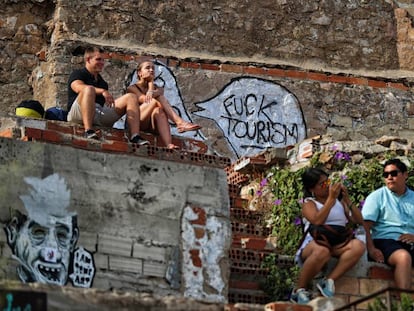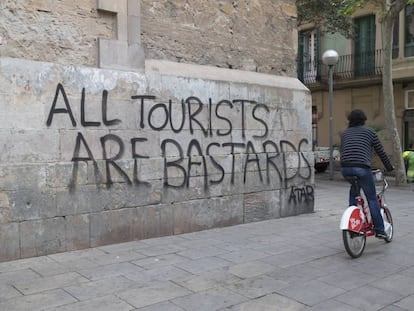Number of foreign visitors to Spain staying in tourist apartments soars by 33%
Hotel sector calls for regulation of online accommodation platforms such as Airbnb

More and more visitors to Spain are are choosing to stay in apartments rather than hotels. The number of foreign tourists using platforms such as Airbnb in Spain increased by one million during the first half of 2017, a 33% hike that takes the total to around four million, according to the latest data from the National Statistics Institute (INE). To put the figure in perspective, the total number of visitors to Spain in the first six months of this year was 35.3 million, but the tourist apartment segment is the industry sector that is seeing fastest growth.
Resentment is the result uncontrolled growth in the number of apartments available
Luis Zoreda, the vice president of Exceltur
The INE has also published figures showing that the total spending by those tourists in Spain who didn’t stay in hotels rose by 25% in the first half of the year, but this also includes spending at small rural hotels, campsites, and hostels. Three quarters of the growth in spending by this group was nevertheless on accommodations booked through online platforms such as Airbnb, HomeAway, or Booking.com.
Furthermore, total spending on non-traditional accommodations grew by twice as much as the spend on hotels during the same time frame. Spending by foreigners who stay in tourist apartments now represents close to a quarter of total accommodation expenses: €7.1 billion of the €37.2 billion spent up until June this year.
Exceltur, the Spanish hotelier’s lobby, says that demand for tourist apartments has risen by 37% over the last year, compared to a 7% increase in demand for hotels and other accommodation options.
Tourism in Catalonia is now worth more than the region’s car industry
Both Exceltur and the Spanish Confederation of Hotels (Cehat) say that the data doesn’t provide the full picture of the growth in the use of privately-owned tourist apartments, which in some Spanish cities is beginning to generate resentment among residents.
“Congestion, gentrification, mass tourism, and resentment is the result of rapid and uncontrolled growth in the number of apartments being offered by platforms,” said Luis Zoreda, the vice president of Exceltur, at a press conference last month in which the association called for regulation of the sector.
Meanwhile, the regional government of the Balearic Islands has announced a limit on private rentals, effectively making any property that is not licensed illegal. It has also put a cap on the number of tourist beds in the region.
Spending by overseas visitors to Spain rose by 14.8% in the first half of the year to €37.2 billion, 36% of which was in the two regions that have registered the greatest number of protests against mass tourism: Catalonia and the Balearic Islands. Tourists spent some €8.2 billion in Catalonia (22% of the total for Spain) in the first half of the year while the region’s car exports over the same period were worth around €5 billion.
Spanish staycations
The growing popularity of tourist apartments in Spain is not limited to foreigners: in the two years from April 2015 to April 2017, some 9.7 million Spaniards taking a staycation used platforms like Airbnb and HomeAway, according to a study carried out by the University of Salamanca. The figure represents a 14.38% increase on the two previous years. Despite the increase, only 10% of people living in Spain choose tourist apartments for their vacations, and the vast majority prefer to stay in a hotel.
English version by Nick Lyne.
Tu suscripción se está usando en otro dispositivo
¿Quieres añadir otro usuario a tu suscripción?
Si continúas leyendo en este dispositivo, no se podrá leer en el otro.
FlechaTu suscripción se está usando en otro dispositivo y solo puedes acceder a EL PAÍS desde un dispositivo a la vez.
Si quieres compartir tu cuenta, cambia tu suscripción a la modalidad Premium, así podrás añadir otro usuario. Cada uno accederá con su propia cuenta de email, lo que os permitirá personalizar vuestra experiencia en EL PAÍS.
En el caso de no saber quién está usando tu cuenta, te recomendamos cambiar tu contraseña aquí.
Si decides continuar compartiendo tu cuenta, este mensaje se mostrará en tu dispositivo y en el de la otra persona que está usando tu cuenta de forma indefinida, afectando a tu experiencia de lectura. Puedes consultar aquí los términos y condiciones de la suscripción digital.










































